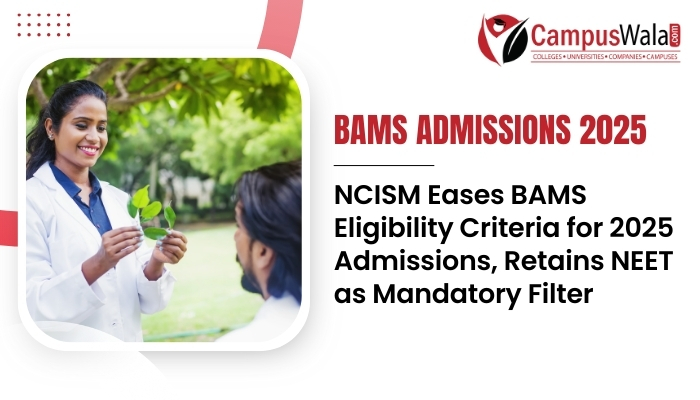NCISM Eases BAMS Eligibility Criteria for 2025 Admissions, Retains NEET as Mandatory Filter

A progressive move by the National Commission for Indian System of Medicine (NCISM) has relaxed the eligibility norms for admission to the Bachelor of Ayurvedic Medicine and Surgery (BAMS) program for the academic year 2025. The previous requirement of scoring a minimum of 50% in Physics, Chemistry, and Biology (PCB) in Class 12 for general category students, and 40% for those from reserved categories, has now been removed. Instead, candidates who have simply passed these subjects — including Biotechnology — in their 10+2 examinations are eligible to apply. However, qualifying the NEET (UG) examination remains a mandatory prerequisite.
This strategic change has been introduced in response to growing concerns about limited access for otherwise capable students who may not meet the rigid 50% PCB cut-off but can perform well in NEET. With this decision, NCISM aims to democratize access to the AYUSH education stream, especially Ayurveda, by focusing more on national-level merit through NEET rather than state board variability in Class 12 performance.
The inclusion of Biotechnology as an eligible subject alongside Biology is another noteworthy update. It broadens the academic base and offers more flexibility to students with diverse science backgrounds. It is also a recognition of evolving trends in healthcare and life sciences that increasingly value interdisciplinary knowledge.
This revised eligibility will apply to over 600 Ayurveda colleges across India, which collectively offer around 40,000 BAMS seats. With over 22 lakh candidates appearing for NEET this year, the decision could increase the number of aspirants eligible for counselling, thereby intensifying competition while improving opportunity equity.
For institutions, this change means a more diverse applicant pool and an emphasis on NEET-based merit rather than Class 12 marks alone. For students, it offers a second chance — especially those who may not have scored high in board exams but are prepared for NEET.
By shifting the focus from board exam performance to national-level merit assessment, the NCISM has signalled a forward-looking approach in AYUSH education. The move balances inclusivity with academic rigor and is likely to be welcomed by both students and educators aiming to modernize traditional medical education in India.

